Teaching Proper Teeth Brushing to Preschoolers
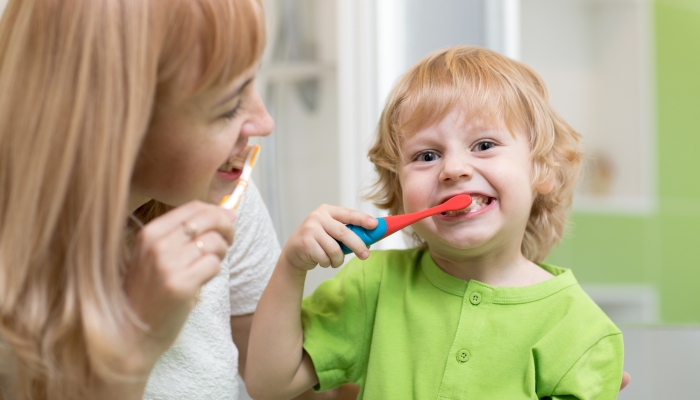
- Preschoolers should brush their teeth twice daily, like older children and adults.
- Healthy oral hygiene develops good brushing habits and helps prevent tooth decay.
- Children should visit the dentist when they turn one or six months after their first tooth appears.
- Despite baby teeth eventually falling out, encouraging your kids to brush their teeth at an early age is essential.
I spend most of my mornings hollering “brush your teeth” to my kids. I’m also guilty of asking if they are sure they got to every tooth in their mouth. I usually get a “yes, mommy,” with a bit of an eye roll.
While they know it’s part of the routine, I ensure they do it before they head to school. When my kids were infants, I started with a silicone brush on my finger and made small circles across their little teeth to get them used to the sensation.
However, as they got older, I transitioned to a regular toothbrush as they went from baby to toddler to preschooler.
Teaching teeth brushing to preschoolers isn’t rocket science, but it takes persistence and using a few tricks up your sleeve.
Don’t forget to save these tips to help encourage your kids to brush their teeth and enjoy it!
At What Age Should Kids Brush Their Teeth on Their Own?
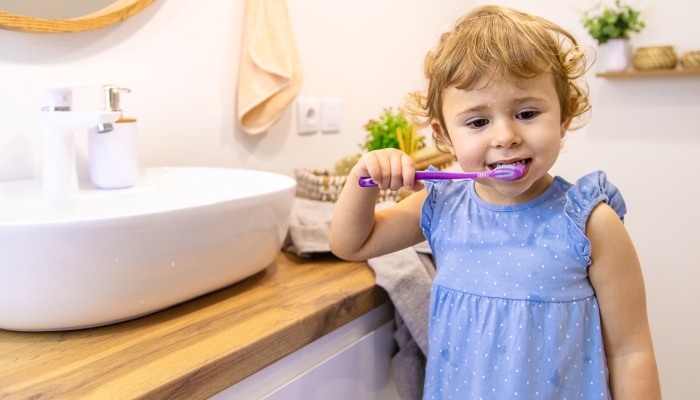
Children develop at their own pace, and some children will be ready to brush on their own before others. At this age, your child is also still developing oral motor skills, which help with horizontal tongue and jaw movement.
According to the American Academy of Pediatrics (AAP), kids should be able to brush their own teeth between 7 and 8 years old11. AAPD, American Academy of Pediatric Dentistry. Promoting Oral Health. . https://downloads.aap.org/AAP/PDF/Bright%20Futures/BF4_OralHealth.pdf.
While children can practice brushing their teeth well before then, the AAP explains that young children don’t have the manual dexterity to brush their teeth until they can tie their shoes.
In addition, you can usually trust older children with brushing time but ensure they use an appropriate amount of toothpaste.
Remember, children won’t have all their permanent adult teeth until they are at least 12, but it’s important to teach kids to brush teeth at an early age.
Why Should Preschoolers Learn How to Properly Brush Their Teeth?
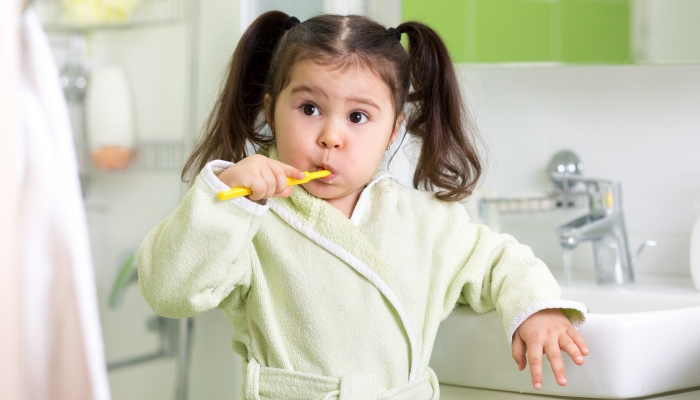
It Helps Develop Fine Motor Skills
Developing fine motor skills is a massive milestone in kids; brushing teeth helps check that box. Believe it or not, brushing your teeth takes more work than you’d think.
For instance, your child must grasp the toothbrush correctly and isolate their forearm and wrist to turn it in their mouth.
In addition, once they start using toothpaste, they must have the agility and strength to unscrew, open, and squeeze it.
When they finish brushing, they can continue to work on their motor skills by screwing the cap back on.
Instills Good Oral Hygiene
When kids brush their teeth effectively, they remove bacteria and help prevent tooth decay.
In addition, by introducing toothbrushing at an early age, your kids will likely grow up knowing it is part of their daily routine.
Most kids are good about brushing their teeth when they are used to it, and I know my children love routine and flourish from it.
Helps Establish Independence
While we aren’t ready to send our preschoolers out to the real world, letting them do specific tasks, like brushing their teeth, gives them a sense of independence.
Remember, you want to ensure your child brushes the inside surfaces, front teeth, and chewing surfaces in their mouth. For safety reasons, you’ll want to watch them while they brush.
A Parent’s Guide on How to Teach Teeth Brushing to Preschoolers
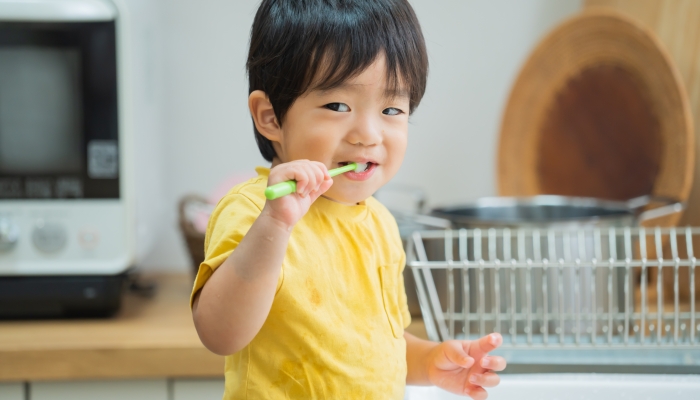
It’s a fun milestone when your child gets their first tooth, minus the fussiness. But what comes next?
According to the American Dental Association (ADA), you should start brushing your baby’s teeth when their first tooth appears22. Department of Scientific Information, Evidence Synthesis & Translation Research, ADA Science & Research Institute, LLC. Toothbrushes. American Dental Association. 2022. https://www.ada.org/resources/research/science-and-research-institute/oral-health-topics/toothbrushes and plan their first dentist appointment soon after.
The American Dental Association also recommends you supervise your child while brushing their teeth until they can spit out excess toothpaste after brushing.
Helpful Tips to Consider When Teaching Your Preschooler Teeth Brushing
- Begin brushing your child’s teeth when the first tooth appears
- Brush gently to ensure your child doesn’t associate pain with tooth brushing
- Use an infant-sized toothbrush when your child first begins brushing their teeth
- Find a soft-bristled toothbrush so it is gentler on your child’s gums
- You can use a soft cloth when first teaching kids how to brush their teeth
- Use only a pea-sized amount of toothpaste and gently brush across the gum line
- Visit a pediatric dentist when your child turns one, and make regular visits every six months
- Floss your preschooler’s teeth once a day if they have two teeth touching
Even though your preschooler doesn’t have permanent teeth, starting healthy habits at a young age is essential. Also, encouraging your child to brush their own teeth will likely make them feel like a big kid!
Tips for Making Teeth Brushing Fun for Kids
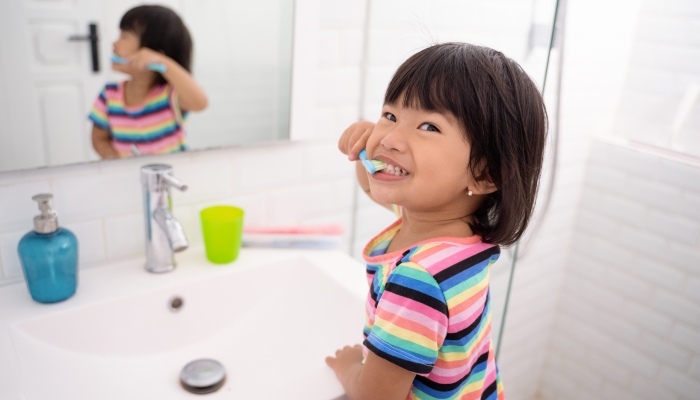
As a mom of three, I’ve realized everything is easier when it becomes a game. While I’m also a firm believer in my children understanding there are specific things they must do, I also enjoy making my life easier occasionally.
Finding dental health activities makes tooth brushing more exciting and promotes healthy teeth.
Top tips for making teeth brushing fun for kids:
- Use an electric toothbrush and let your child choose one with their favorite character to make brushing more fun.
- Make it a game by dancing along while they brush. I’ve done squats while my kids brushed, which adds a bit of a workout for me.
- Let your child brush their toy’s teeth to show that everyone, even their favorite stuffed animal, needs clean teeth.
- Offer positive reinforcement to encourage your child to brush for the appropriate amount of time. Remember, praising good behavior doesn’t have to mean expensive toys or extra dessert. It can also be staying an extra ten minutes at the park, getting spare play time before bed, or going to the dollar store and finding inexpensive incentives.
- Make silly noises when your kids brush their teeth, but stop if they stop too early. Hopefully, they enjoy your humor and will want to continue brushing until they’ve hit the two-minute mark.
- Brush your teeth with your child to show them toothbrushing time can be a fun experience for the whole family. A 2011 study by Makuch et al. published by the Journal of Dentistry for Children found that imitating another person33. Makuch, A., Reschke, K., & Rupf, S.. Effective teaching of tooth-brushing to preschool children. Journal of dentistry for children (Chicago, Ill.). 2011;78(1), 9–12. https://pubmed.ncbi.nlm.nih.gov/22041002 was more effective when brushing.
- Download an app to encourage little kids to enjoy brushing, like Brush DJ or Chomper Chums.
FAQs
What should I do if my child resists brushing their teeth?
If your child resists brushing their teeth, you should never force it. Forcing something like brushing teeth properly can lead to kids fighting it harder in the long run.
Instead, it’s always a good idea to go at their pace and remember you can use a wet washcloth on your child’s teeth to get them used to the sensation.
What should I do if my child complains of tooth or gum pain while brushing?
If your child complains of tooth or gum pain while brushing, use a toothbrush with soft bristles and don’t push down hard.
You can remind your child that healthy teeth don’t come from aggressive brushing.
Are there any specific recommendations for children with special needs or sensory sensitivities?
You can use a special needs toothbrush if your child has difficulty brushing. A specialty toothbrush helps make the brushing routine easier and ensures your child is comfortable.
Brushing teeth and dental hygiene are essential to instill, but it’s also vital you go at your child’s pace.
References
- AAPD, American Academy of Pediatric Dentistry. (n.d.). Promoting Oral Health. https://downloads.aap.org/AAP/PDF/Bright%20Futures/BF4_OralHealth.pdf
- Department of Scientific Information, Evidence Synthesis & Translation Research, ADA Science & Research Institute, LLC. (2022, October 7). Toothbrushes. American Dental Association. https://www.ada.org/resources/research/science-and-research-institute/oral-health-topics/toothbrushes
- Makuch, A., Reschke, K., & Rupf, S. (2011). Effective teaching of tooth-brushing to preschool children. Journal of dentistry for children (Chicago, Ill.), 78(1), 9–12. https://pubmed.ncbi.nlm.nih.gov/22041002
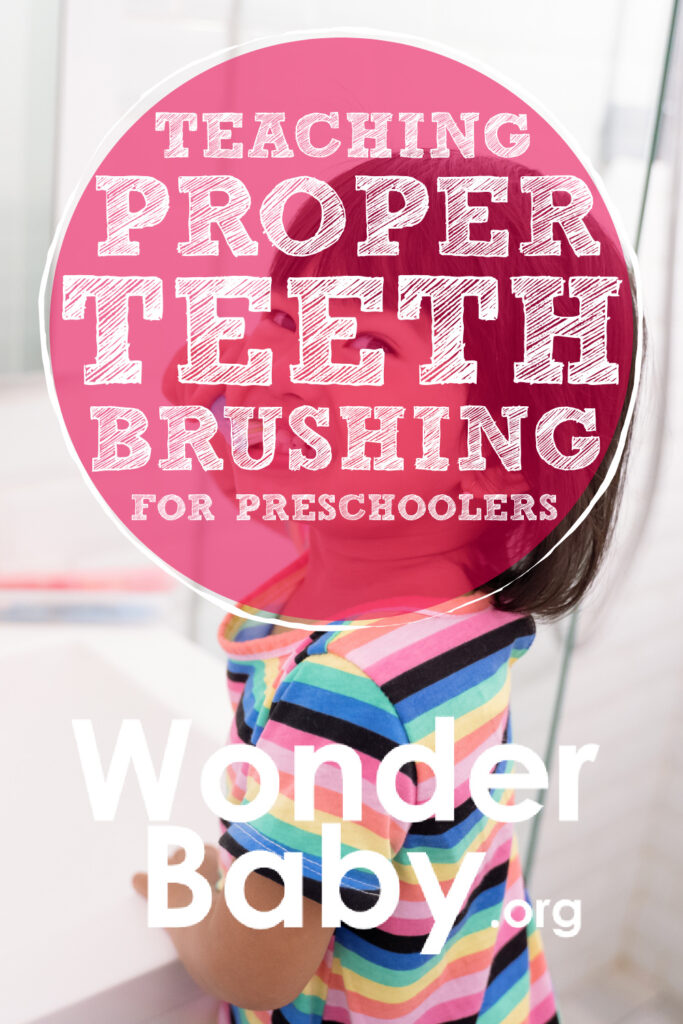
Related Posts

Eye Conditions and Syndromes, Visual Impairment
Neuralink Announces Plans to Restore Sight to the Blind with Brain Chip
Elon Musk’s company Neuralink has announced plans to begin human trials of its new “Blindsight” brain chip by the end of 2025.

Health & Nutrition
Can Baby Skin Care Products Expire?
Is that forgotten tube of diaper rash cream still safe to use? Learn more about the expiration dates of popular skin care products for infants.

Health & Nutrition
Boosting Immunity in Kids: 3 Tips for a Healthy Winter
Parents can help boost their kids’ immunity during cold and flu season by maintaining healthy eating, sleeping, and exercising habits in the winter.